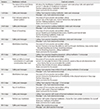Abstract
Purpose
The purpose of this study was to examine a Korean Mindfulness Based Stress Reduction (K-MBSR) program for middle aged women and to verify the program's effectiveness on stress, stress coping style, depression, anger and sleep.
Methods
Fifty-two women aged from 40 to 59 (26 in the experimental group and 26 in the control group) from G city participated in the study. Data were collected from February 13 to April 3, 2013. The experimental group received 8 sessions, scheduled once a week, with each session lasting two and a half hours. Outcome variables included stress, stress coping style, depression, anger, sleep and a physiological measure (EEG).
Figures and Tables
Notes
References
1. Hwang YS. Application of sandplay therapy in a case of a middle-aged woman of depressive tendency. Korean J Play Ther. 2007; 10(4):81–95.
2. Song YS. Path model analysis of stress, coping method, quality of life and spiritual maturity of middle age Christian women [dissertation]. Cheonan: Baekseok University;2009.
3. Byeon WJ, Kim CK. A study on the relevant variables of middle-aged women's depression. J Korean Home Econ Assoc. 2006; 44(7):125–139.
4. Brown JD, Mankowski TA. Self-esteem, mood, and self-evaluation: Changes in mood and the way you see you. J Pers Soc Psychol. 1993; 64(3):421–430.
5. Lee Y. The lived experiences of the middle-aged women's anger. J Korean Acad Psychiatr Ment Health Nurs. 2007; 16(4):411–419.
6. Lee PS. Correlational study among anger, perceived stress and mental health status in middle aged women. J Korean Acad Nurs. 2003; 33(6):856–864.
7. Thomas SP, Atakan S. Trait anger, anger expression, stress, and health status of American and Turkish midlife women. Health Care Women Int. 1993; 14(2):129–143. DOI: 10.1080/07399339309516035.
8. Oh JJ, Song MS, Kim SM. Development and validation of Korea sleep scale A. J Korean Acad Nurs. 1998; 28(3):563–572.
9. Folkman S, Lazarus RS. If it changes it must be a process: Study of emotion and coping during three stages of a college examination. J Pers Soc Psychol. 1985; 48(1):150–170.
10. Kang G, Oh S. Effects of mindfulness meditation program on perceived stress, ways of coping, and stress response in breast cancer patients. J Korean Acad Nurs. 2012; 42(2):161–170. DOI: 10.4040/jkan.2012.42.2.161.
11. Park K, Jun JS, Jung SY. The effects of Korean mindfulness based stress reduction program on the psychological symptoms, sleep and quality of life, in Korea breast cancer patients. Korean J Stress Res. 2013; 21(3):249–262.
12. Kabat-Zinn J.
HK Chang
KH Kim
JY Jang
. Full catastrophe living: Using the wisdom of your body and mind to face stress, pain, and illness. 2nd ed. Seoul: Hakjisa Corp.;2005.
13. Lee WK, Bang HJ. The relationship among stress of adult women, mindfulness, self-compassion, psychological well-being and psychological symptoms. Korean J Dev Psychol. 2008; 21(4):127–146.
14. Bae JH. Effects of K-MBSR program according to the length of the training period on emotional response of college students. J Korea Contents Assoc. 2010; 10(11):198–208. DOI: 10.5392/JKCA.2010.10.11.198.
15. Yoon BS. Effect of K-MBSR on attention: CAMS-R, ANT, and sLORETA. Korean J Psychol Gen. 2012; 31(2):521–540.
16. Choo KS, Song HJ. Effects of K-MBSR program on depression anxiety, and stress coping: Mothers with disabled children. Korean J Psychother. 2009; 9(1):113–128.
17. Leventhal H, Cameron L. Behavioral theories and the problem of compliance. Patient Educ Couns. 1987; 10(2):117–138. DOI: 10.1016/0738-3991(87)90093-0.
18. Koh KB, Park JK, Kim CH. Development of the stress response inventory. J Korean Neuropsychiatr Assoc. 2000; 39(4):707–719.
19. Peniston EG, Marriman DA, Deming WA, Kulkosky PG. EEG alpha-theta brain wave synchronization in Vietnam theater veterans with combat related post traumatic stress disorder and alcohol abuse. Med Adv Med Psychother. 1993; 6:37–50.
20. Kim JH, Lee CH. The relationships of configuration factors and depression of stress coping style. J Behav Sci. 1985; 7(1):127–138.
21. Chon KK, Choi SC, Yang BC. Integrated adaptation of CES-D in Korea. Korean J Health Psychol. 2001; 6(1):59–76.
22. Henriques JB, Davidson RJ. Left frontal hypoactivation in depression. J Abnorm Psychol. 1991; 100(4):535–545.
23. Chon KK, Hahn DW, Lee CH, Spielberger CD. Korean adaptation of the state-trait anger expression inventory: Anger and blood pressure. Korean J Health Psychol. 1997; 2(1):60–78.
24. Chang HK, Kim JM, Bae JH. The development of Korean version of mindfulness-based stress reduction program and the effects of the program. Korean J Health Psychol. 2007; 12(4):833–850.
25. Dykens EM, Fisher MH, Taylor JL, Lambert W, Miodrag N. Reducing distress in mothers of children with autism and other disabilities: A randomized trial. Pediatrics. 2014; 134(2):e454–e463. DOI: 10.1542/peds.2013-3164.
26. Shim JY, Kim YH. Effects of brain respiration training on electroencephalogram and depressive state in old women. Korean J Sport Psychol. 2006; 17(4):117–133.
27. You SY. The effects of mindfulness meditation on symptoms of hwa-byung depression, anxiety and stress: in middle aged women [master's thesis]. Seoul: Duksung Women's University;2010.
28. Cincotta AL, Gehrman P, Gooneratne NS, Baime MJ. The effects of a mindfulness-based stress reduction programme on pre-sleep cognitive arousal and insomnia symptoms: A pilot study. Stress Health. 2011; 27(3):e299–e305. DOI: 10.1002/smi.1370.
29. Winbush NY, Gross CR, Kreitzer MJ. The effects of mindfulness-based stress reduction on sleep disturbance: A systematic review. Explore (NY). 2007; 3(6):585–591. DOI: 10.1016/j.explore.2007.08.003.
30. Lee KH, Park KM, Ryu MK. The effect of aromatherapy with lavender essential oil on sleep disturbance and depression on middle-aged women. J Korean Soc Matern Child Health. 2002; 6(1):23–37.




 PDF
PDF ePub
ePub Citation
Citation Print
Print







 XML Download
XML Download